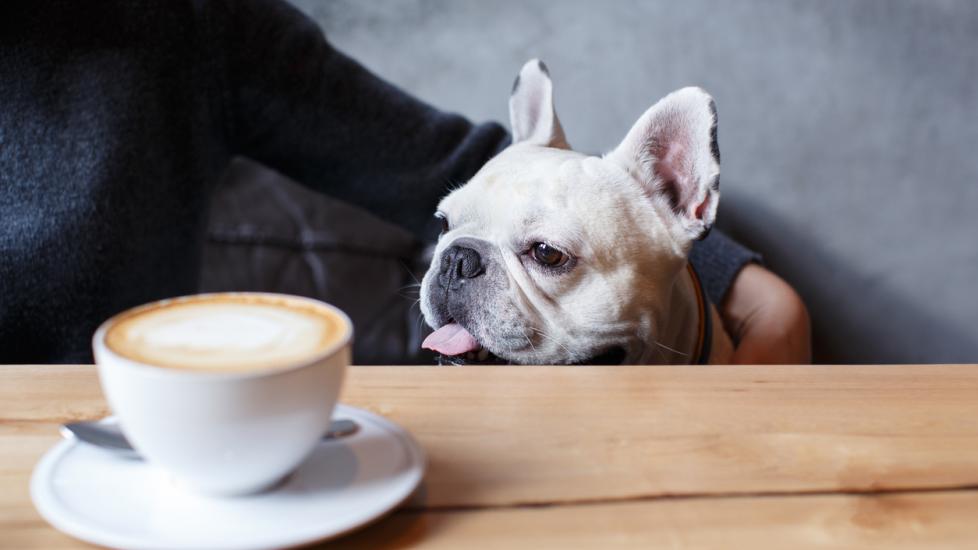Can Dogs Drink Coffee?
If your dog has consumed coffee, contact your veterinarian immediately, or contact the Pet Poison Helpline at (855) 764-7661.
Many Americans drink coffee every day and love to brew it at home. Although coffee can be fine for humans, it’s very bad for dogs, and can even be toxic. If you drink coffee, there’s always the potential that your dog could get into the coffee grounds or drink some of your coffee if it’s left unguarded.
Here’s some important information on just how bad coffee and caffeine are for dogs, and what you should do if your dog got into the coffee.
Is Coffee Bad for Dogs?
Yes, coffee is bad for dogs. Depending on how much they ingest, it could be toxic to them. The problem is caffeine. Dogs are much more sensitive to caffeine than humans are, and consuming coffee could lead to caffeine poisoning.
The severity of this situation depends on how much your dog consumed, how concentrated the caffeine is, and how big your dog is. Coffee grounds have a higher concentration of caffeine than coffee. And smaller dogs will be affected more severely by a small amount of caffeine than a large dog would.
Espresso is more concentrated than a regular cup of drip or instant coffee, but it’s usually diluted with hot water (as in an Americano) or some type of milk (as in a latte). This would make the total caffeine amount similar to a regular cup of coffee.
If you’re thinking that decaf coffee might be safe, keep in mind that decaf isn’t 100% decaffeinated. There are still trace amounts of caffeine in it—meaning it can still harm your pup.
Any added ingredients can also be bad for your dog. The items below are either unhealthy for dogs, can upset your dog’s stomach, or are toxic to dogs.
-
Sugar: Sugar is unhealthy for dogs and can give them an upset stomach.
-
Milk: Some dogs can drink milk, but others may be lactose- intolerant.
-
Macadamia nut milk: Macadamia nut milk is toxic to dogs because macadamia nuts are toxic to them.
-
Xylitol: Xylitol is toxic to dogs, and is often used as a sweetener in coffee creamers.
-
Added flavors: Other ingredients you may add to your coffee, like chocolate or nutmeg, can be toxic to dogs.
Signs of Caffeine Toxicity in Dogs
According to the Pet Poison Helpline, “A small lick from your mug is unlikely to cause harm, but excessive doses of caffeine can lead to dangerous symptoms and even death. A dog’s nervous system, cardiovascular, and gastrointestinal systems can be affected from ingesting caffeine.” Caffeine toxicity can also adversely affect a dog’s kidney, liver, and lungs.
Caffeine toxicity in dogs can show up as quickly as 30 minutes after consumption, but it usually manifests within the first 1-2 hours. Watch for the following common symptoms:
-
Restlessness
-
Hyperactivity
-
Agitation
-
Seizures
-
Elevated heart rate
-
High blood pressure
-
Hyperthermia (warm to the touch, drooling, dark red gums)
-
Tremors
Take note of how much coffee your dog has consumed—and what type—so your veterinarian can better help your dog.
What To Do if Your Dog Drank Coffee
If your medium- to large-breed dog just took a lick or two from your coffee cup, they will most likely be fine. But if they somehow drank an entire cup of coffee, it’s time to be concerned. And for small-breed dogs, just a small amount can have a large effect on them. Contact your veterinarian and let them know how much coffee you believe your dog has consumed.
What To Do if Your Dog Ate Coffee Grounds or Beans
Contact your veterinarian immediately. Never try inducing vomiting on your own without your veterinarian’s instruction and consent, as this could cause more complications.
Eating coffee beans or grounds is much worse for your dog than drinking coffee. Brewed coffee is much more diluted than the grounds themselves. No matter the size of your dog, eating even a small amount of coffee beans or grounds can be very hazardous for your dog.
How Vets Treat Caffeine Poisoning
The sooner your dog is seen by a veterinarian, the better. Time is of the essence in poisoning situations.
Your veterinarian may decide to induce vomiting to get the toxin out of your dog’s system before it’s completely absorbed. Additionally, they may choose to give your dog activated charcoal to help reduce the absorption of any toxin that remains in the gastrointestinal tract.
After that, your vet will typically use IV fluids to keep your dog hydrated—especially if they’ve suffered from diarrhea and vomiting. The fluids may flush out some of the caffeine and help support your dog’s kidney function.
The vet will probably also administer medications to help treat some of your dog’s symptoms, such as seizures, muscle tremors, low blood pressure, and an irregular heartbeat.
For mild cases, you can expect your dog to be hospitalized for the day. But for more severe cases, they will probably need to be hospitalized for a few days.
Can Dogs Die from Ingesting Coffee?
Sadly, yes. According to the Pet Poison Helpline, an excessive amount of caffeine from coffee can lead to “dangerous symptoms and even death.” But most dogs will survive caffeine consumption—if they get help from a veterinarian immediately.
Severe caffeine poisoning is possible from brewed coffee as well as coffee beans or grounds. However, it’s much more likely to happen from consuming coffee beans or grounds because they have a much higher concentration of caffeine.
The biggest factors that determine the severity of your dog’s caffeine toxicity and their prognosis are the amount and type of coffee they’ve consumed, the weight of your dog, and whether they have any preexisting health conditions.
Featured Image: iStock/Valeriya Anufriyeva
